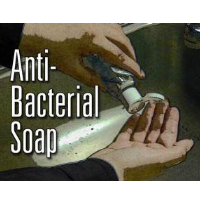FDA Demands Proof that Antibacterial Soaps are Effective
 (AP Graphic)
(AP Graphic)
The Food and Drug Administration (FDA) shocked the soap industry this week when it demanded that manufacturers prove that antibacterial chemicals in their products are safe, or prepare to remove them.
The decision comes after years of concerns by public health experts who warned that the chemicals may do more harm than good by negatively impacting human hormones and expanding the risk of drug-resistant infections, among other things.
Rolf Halden, director of the Center for Environmental Security at Arizona State University, told The New York Times that it was “a big deal that they are taking this on.”
“These antimicrobials have taken on a life all of their own,” Halden said. “Their use has really proliferated.”
The chemicals—triclosan and triclocarban—have become so prevalent that studies have found them present in the majority of the U.S. population. They accumulate in ground water and soil, and have been detected in the breast milk of 97% of the women tested. Additionally, the Centers for Disease Control and Prevention determined that the chemicals are present in the urine of 75% of all Americans.
In addition to antibacterial soaps, the chemicals are used in such products as fabrics, laundry detergent, mouthwash and baby pacifiers. Their use in toothpaste has been on the wane due to these health concerns. The chemicals have long been used by surgeons for washing their hands before operating on patients.
Concern over the chemicals first arose in the 1970s. However, little action was taken, say health advocates, for two reasons: foot-dragging by the FDA and, more significantly, industry lobbying.
Studies on animals indicate that use of these chemicals can alter the natural development of metabolism and the reproductive system. Experts warn that they may affect humans in the same way. This scientific research triggered the FDA’s concern.
In making its announcement, the FDA said there was no evidence that the chemicals were any more effective in preventing infection than plain soap and water. Several industry trade groups disagree, citing studies showing that antibacterial soap results in “statistically greater reductions in bacteria on the skin” than with regular soap.
Colleen Rogers, a lead microbiologist at the FDA, said: “New data suggest that the risks associated with long-term, daily use of antibacterial soaps may outweigh the benefits.”
Makers of the soaps have a year to prove they are effective and safe, or else pull them off the market.
-Noel Brinkerhoff, Danny Biederman
To Learn More:
F.D.A. Questions Safety of Antibacterial Soaps (by Sabrina Tavernise, New York Times)
FDA Taking Closer Look at 'Antibacterial' Soap (U.S. Food and Drug Administration)
Safety and Effectiveness of Consumer Antiseptics (U.S. Food and Drug Administration) (pdf)
Dial Soap Hit by Class Action Suit Alleging False Anti-Germ Claims (by David Wallechinsky and Noel Brinkerhoff, AllGov)
- Top Stories
- Unusual News
- Where is the Money Going?
- Controversies
- U.S. and the World
- Appointments and Resignations
- Latest News
- Trump Renames National Football League National Trump League
- Trump to Stop Deportations If…
- Trump Denounces World Series
- What If China Invaded the United States?
- Donald Trump Has a Mental Health Problem and It Has a Name






Comments